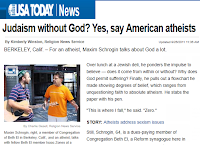By Gary Berg-Cross
Some important topics
like secular humanism and climate change are hard to get accepted by people for
one reason of another. Secular humanism has its principles, goals and core ideas
laid out in the various Humanist Manifestoes. But
to many it explanations and approach aren’t satisfactory. Part of
the reason is that is an inconvenient threat to biblical and older views of the
world and a God who intervenes in natural phenomena and is indispensable for
salivation.
Coming to grips with climate
change is another one of those difficult topics where complex, scientific evidence
and reasoning comes in conflict with simpler and perhaps emotionally satisfying
non-scientific beliefs. People’s immediate experience is with weather and local
weather at that. This easy understanding gets confused with
climate as it in entangled with common sense and verbal habits (always a factor in discussing
atheism and concepts of God too). So people say you
“can’t change the weather” (or predict it well going past 10 days) and these seem to be
powerful arguments against knowing about climate change with a needed degree of certainty. If fact they are not good arguments at all. One may predict a green house will be warmer than its surroundings even on a cold day.
You can see and example of how particular issues, often statistical in nature, get resolved such as how much warming is going on in Antartica see- On Edge-Pushing Statistics and Climate Basics. Statisticians like Noel Cressie have directly investigated "Uncertainty
Quantification for Regional Climate Projections in North America" by studying the various model projecting temperature change that is projected for North America 30 years in the future (2041-2070). Regional Climate Models (RCMs) projections are run up to 60 years into the future for "small", 50 km x 50 km regions in North America.
The results including degrees of uncertainty are analyzed statistically for all regions and all four Boreal seasons. The preponderance of results throughout all of North America, as shown in the pinkish figures below is one of warming, usually more than 2°C (3.6°F). As Cressie asked, "is this hot enough for you."
You can see and example of how particular issues, often statistical in nature, get resolved such as how much warming is going on in Antartica see- On Edge-Pushing Statistics and Climate Basics. Statisticians like Noel Cressie have directly investigated "Uncertainty
Quantification for Regional Climate Projections in North America" by studying the various model projecting temperature change that is projected for North America 30 years in the future (2041-2070). Regional Climate Models (RCMs) projections are run up to 60 years into the future for "small", 50 km x 50 km regions in North America.
The results including degrees of uncertainty are analyzed statistically for all regions and all four Boreal seasons. The preponderance of results throughout all of North America, as shown in the pinkish figures below is one of warming, usually more than 2°C (3.6°F). As Cressie asked, "is this hot enough for you."
Recently some scientific
efforts have been directed at such phenomena and understanding why belief in climate
change has decreased rather than risen as more evidence has been generated. It
turns out there are a variety
of complex psychological, and cultural reasons for this as well as scientific.
One obvious factor is complexity of
space, time and factors. There are lots of facts to consider and models to
integrate since almost every aspect of our planet influences the climate –
ocean circulation,
weather patterns,
plate tectonics (over long
time) and ,
atmospheric dynamics are
just a start.
A change in one of these affects climate
and progress has being made in modeling each although the interaction of factors
with each other and the climate is still a challenge. But like the weather everyone has something to
say on the matter even if the complexity is ignored in most opinions by laymen.
Psychologically we like simple answers and simplifying problems down to familiar
terms. Still understanding is possible to the literate and astute
who have the time to study it.
But there is a problem with space and time. The impacts are
somewhat off in the future or impacting far away space like the artic now (Super
Storm Sandy being an exception which did get our attention.) . But these demand action
and costly action now. So there is a mis-match and what is being asked (see recent blog on protests) for now
is some sacrifice for some hypothetical gain. What is being asked for is deferred gratification. It’s not like cleaning up a park or a polluted river. There we can often easily track
responsibility for a problem and results can be quickly seen and rewards such
as return of fish in river a known reward.
Handling climate change is new and the expected rewards far
off and maybe beyond our lifetime. No
matter how much we slow the growth of emissions, we may not see the benefits in
the short-term. Thus, climate change activists are asking fellow citizens to sacrifice
something concrete (say my investment and retirement portfolio) now for potential benefits that may not be evident for many
years to come.
In its own way
this is a bit like what secularists are asking of religious people –
sacrificing some comforting habits now to avoid down sides over time. We need
to have the maturity to understand the dangers of climate change and the wisdom
for that may translate as a useful skill for the advancement of humanist and
secular thinking too.
Images
The Psychology of Climate Change: http://guide.cred.columbia.edu/
Noel Cressie ergional models of climate change: http://www.stat.osu.edu/~sses/collab_warming.html
Noel Cressie ergional models of climate change: http://www.stat.osu.edu/~sses/collab_warming.html
Sacrificing investments:http://grist.org/article/2009-11-05-climate-psychology-in-cartoons-clues-for-solving-the-messaging/full/
Religious addiction: http://www.secularhumanism.org/index.php?section=library&page=flynn_27_4
























